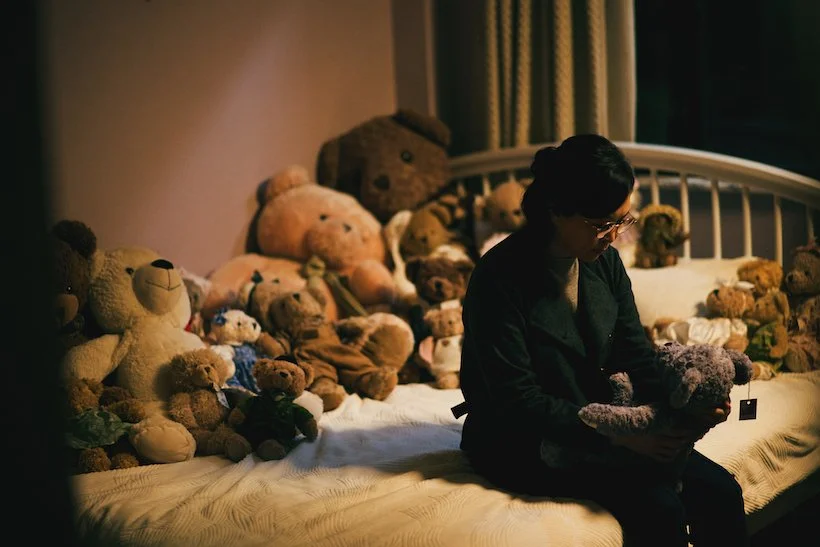To Forgive, Divine?
lam Sen and Antonio Tam wade into dodgy waters and mostly come out clean on the other side in their debut.
Valley of the Shadow of Death
Director: Lam Sen, Antonio Tam • Writer: Antonio Tam
Starring: Anthony Wong, George Au, Louisa So, Sheena Chan
Hong Kong • 1hr 48mins
Opens Hong Kong June 5 • IIB
Grade: B
In the rest of the world, billionaires are currently having a significant PR problem, and rightly fuckin’ so, but here in Hong Kong it seems the side-eye is being directed at the church. Alright, admittedly two films falls short of a trend but the villain in Trevor Choi’s Smashing Frank was a church, more specifically the pastor of one of those janky little off-brand temples on the second floor of an office building. Choi painted him as one of those celebrity saviours who can help his congregants best when they give him money. You can’t scroll two “For you!” pages on Netflix without seeing a doc series about some kind of shady bitch just like him.
There’s a pastor at the heart of debuting directors Jeffrey Lam Sen and Antonio Tam Sin-yeung’s Valley of the Shadow of Death | 不赦之罪, but he’s the genuine article, preaching love and forgiveness to his flock and giving Lam and Tam (also screenwriter) a jumping off point for an interrogation of just those concepts. Lam and Tam channelled growing up in Christian homes into a film that asks us all – devout and heathen alike – to consider just how far love and forgiveness goes, especially when confronted with someone begging forgiveness for an egregious wrong. Do we practise what we preach? Should we find alternate cheeks? It’s not quite summer fare, but Lam and Tam’s thought piece is well observed and feels authentic, and ponders its central moral quagmire without judgement of its viewers or its characters.
Pastor Leung (Anthony Wong Chau-sang) leads the congregation at the Church of Faith and Love. He’s a humble man, devoted to his God and a beacon of good for his church. He, and his wife (Louisa So Yuk-wah, A Guilty Conscience), are also deeply wounded, mourning the death of their only daughter Ching (Sheena Chan Shu-yan, Blossoms Under Somewhere), after her suicide, the result of being raped. Because of course. Leung agrees to help when one of his parishioners welcomes a young man in need of some guidance into the church, who turns out to be Ching’s rapist and now ex-con, Ah Lok (George Au Chun-hoi, P1X3L, ViuTV’s Left on Read). Hoary as that sounds, the chance meeting is the foundation for Tam’s exploration of right, wrong, justice, vengeance and, ultimately, the capacity to forgive.
Like any good servant of God, Leung is faced with two paths and the film’s drama comes from his struggle to choose between the one that’s right (whatever that is) and the one that feels good. As a nurse, a medical professional bound by science whose faith has been crushed, Leung’s wife provides a logical counterpoint to his spiritual dilemma. Caught in between is Ah Lok, a criminal guilty of “the unforgivable sin” (as the title in Chinese states), who’s done his time according to the law but who’s looking for redemption. He doesn’t know what that looks like, and he hopes Leung can show him. Some drama indeed results from this.
In navigating the thorny subject of sexual assault – again used as a motivating factor for a couple of men – Lam and Tam walk a very fine line between fridging and victim-blaming and sincere questioning. And not in that bullshit “Just asking questions here” line that neo-Nazis and Trumpets throw out when they know they’re being racist/homophobic/misogynist/classist and want to worm off the hook. Tam’s positioning of Ching as, let’s face it, a bitch comes right up to the line, but it also makes his point of “So what?” It’s a push; it could use more finesse, but I’ll allow it considering how sensitive the rest of the storytelling is, elegantly visualised in shades of dark and darker by DOP Leo Wong Shek-keung (Hong Kong Family). It’s also a way to comb through the Leungs’ selective memories and the way they deal with their loss, and runs a challenging parallel track with Ah Lok. Whether or not Ah Lok is truly sorry, truly reformed or truly taking Leung’s preaching to heart is subjective and goes to the core of the ideas Tam is weighing.
There’s a lot of meat on Valley of the Shadow of Death’s bones (extra-confounding given the fleet running time), most of it is pretty chewy, and hardly any of it is going to land without Wong and Cantopoper Au (!) as the duelling consciences with different relationships to faith. Au is disarmingly heartbreaking (should we be empathising with this guy?) as the lost lamb (heh heh) finding a way to forgiveness through God while Leung watches his connection with God slip away. Their dynamic is suitably complicated and Au acquits himself well opposite Wong, itself a magic trick. That said, So could be the stealth MVP as Ching’s furious mother, a woman who’s dumped the church shit and feels no obligation whatsoever to forgive anyone for anything. So operates on a low simmer for most of the film but you can feel her barely contained rage and sorrow through the screen, and she, more than the “better” men around her, brings the issues Lam and Tam are wrestling with to the surface.



